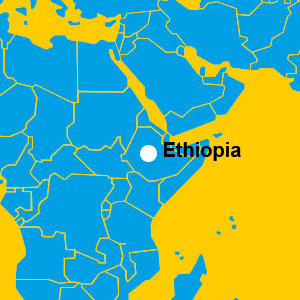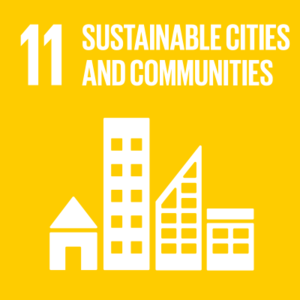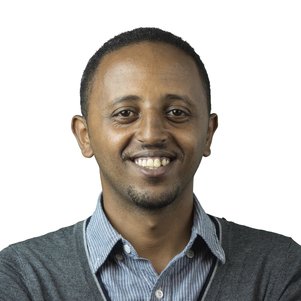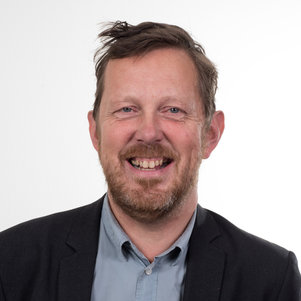As rapid urbanisation creates challenges across the globe, it is increasingly important to understand and address the unique needs of cities in different regions. Anteneh Tesfaye Tola, an Ethiopian urban researcher, is working to shed light on the nuanced aspects of African urbanisation. Through innovative research, collaborations, and forward-thinking vision, Tola is helping redefine how we perceive and develop African cities. Now as a post-doctoral researcher, he’s leading an effort to create a hub for urban research in Africa, facilitating collaboration between African and international institutions.
Tola's involvement with TU Delft began in 2012, when he was Chair of Architecture and Design at the Ethiopian Institute of Architecture, Building Construction, and City Development at Addis Ababa University. An email from Professor Dick van Gameren, Dean of the Faculty of Architecture and the Built Environment, started a long-standing collaborative relationship between the two universities. Around the time that TU Delft | Global Initiative (DGI) was launched, Tola was awarded a Delft Global Fellowship that enabled the start of his PhD research.
Mixed methodology research
Urbanisation, especially on the African continent, poses unique challenges and opportunities that are often misunderstood when viewed through the lens of Western urban theories, explains Tola. His PhD research aimed to bridge this gap by developing methodologies tailored to the African context. "Using the same lenses to understand African cities and then suggest different trajectories of development has created some mismatches in terms of understanding what 'cityness' means in Africa," he says. Tola's work began with a methodological exploration to identify appropriate techniques for studying African cities. His focus was on Addis Ababa, where he examined three neighbourhoods dating back to the city's founding. Using a transdisciplinary methodology he called the "trinocular", Tola used three lenses to delve into these urban spaces: cognitive borders—peoples’ understanding of the limits of their communal environs; social relationships—social networks that are sources of security and social capital for residents; and spatial typologies that embed and characterise these.
This novel methodology is what Tola considers to be the main contribution of his PhD research. “As a technical university, our tendency is towards the technology,” he says. “I go beyond that disciplinary kind of boundary combining anthropology, sociology, urban thinking, urban theory, and architecture to come up with a kind of grafted or mixed methodology.”

Local context
Through his research, Tola introduced three local terms—sefer, iddir, and gebbi—each capturing unique aspects of Ethiopian urban life. "Gebbi literally means a compound where many people live in a shared situation," Tola explains. "A sefer, a settlement or neighbourhood, holds deeper social and anthropological meanings. Iddir represents a form of social capital, embodying the social relationships among residents." These concepts challenge existing urban theories and provide a nuanced understanding of African urban contexts. By articulating these ideas, Tola contributes to a broader discussion on urban theory, highlighting the importance of cultural and social dimensions in urban studies.
Tola's unique position as a local researcher with international connections enables him to translate knowledge and cultural understanding between diverse contexts. "I understand the language and culture, which helps when it comes to developing theories," he explains. "It also allows me to communicate more genuinely with local communities, more than someone foreign coming in with a different language and barriers that make it more complex. Because of my experience abroad I have this intersectional identity between the two cultures and I believe that is useful."
Co-creation breeds collaboration
The idea of co-creation was central from the very beginning, explains Tola. “When Dick framed our relationship, it was always a kind of a partnership in which we constantly co-create,” he says. “And the co-creation concept was fully supported by DGI which has helped to sustain this collaboration.” Tola believes this support created greater impact, facilitating the involvement of other people through education and new collaborations.
One such collaboration is now the focus of Tola’s postdoctoral work. Together with his colleagues at DGI, they came up with the idea of creating a hub, a kind of platform within Africa where urbanisation is the focus. “We want it to be a TU Delft outpost or a sort of campus abroad and to make this platform a nexus between the two institutions for now,” he says. Eventually, the vision for the future is connecting other African universities or researchers who want to collaborate, creating a bridge between TU Delft and African universities. “I see this as a great opportunity and a great challenge. My motivation is to succeed in bridging these two institutions and make it a bit easier for Ethiopian students to do their exchange or education in Delft or at another European university. That would be a great success.”

Future vision
As for the vision of what the hub will actually look like, Tola is working with three scenarios. First, they aim to establish a TU Delft office in Addis Ababa focussed on facilitating research collaborations in both directions. Next, he envisions the two universities running programmes together as well as student exchanges. And the final scenario would be establishing a sort of branch of TU Delft in Addis Ababa. “We don't know exactly what shape that will have, but that's the long-term third scenario that I imagine,” he says.
Making the vision become a reality will take several things, explains Tola. "This long-term scenario requires much more than just my input," he notes. "Of course, money is very important, but there are also areas that I don’t have a background in when it comes to establishing this kind of institution. I will need support with brainstorming, conceptualising, and some technical and financial things. For example, someone with knowledge of how to bridge legal differences between the Netherlands and Ethiopia would be a great support."
Impact
Realising such a hub has potential for impact on many levels, including strengthening institutional capacity in Africa. Tola believes that fostering collaborations can enhance educational opportunities and build expertise within African universities. "It’s not just creating collaborations, but an actual physical space for working together would completely transform and boost the capacity here in Ethiopia,” he says. “And it will also create possibilities for people in Delft who would like to specialise in these topics of African urbanities.”
As Tola continues to create bridges between African and international institutions, he notes that the support of DGI has been instrumental in his journey. "DGI has been very helpful to me personally. It is a family kind of setting that makes me feel at home and that helped my work go smoothly. Through DGI, I've met a lot of people across Africa and abroad who are working on issues related to Africa, so my personal network and view has grown a lot.”

Global Research Areas
| Health | |
| Water | |
| Energy | |
| Disaster Prevention | |
| Urbanisation |




